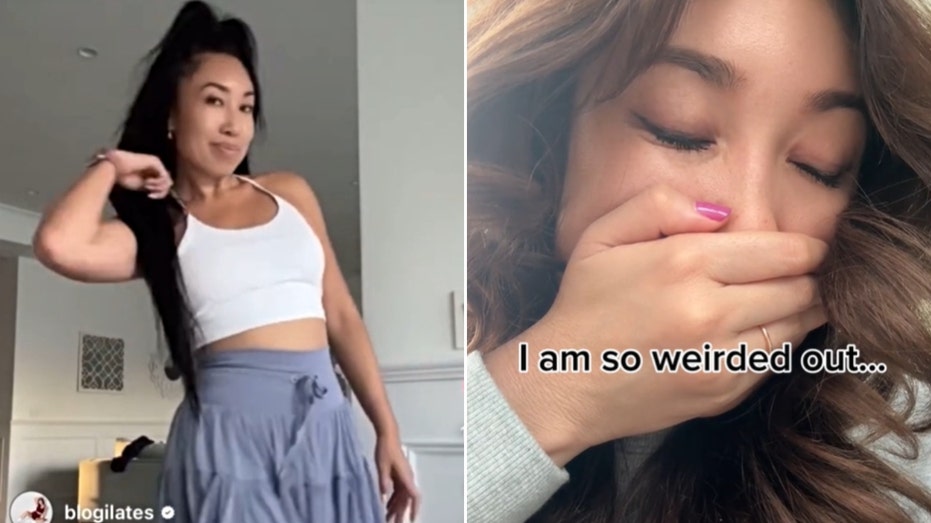Popflex founder, CEO Cassey Ho discusses Amazon seller's attempt to steal, alter video of her product
On April 12, one of Cassey Ho's followers messaged her, flagging a dupe listing of her athletic skort product on Amazon, and what she found left her in disbelief.
Imagine seeing a video of yourself in your own home featured on an Amazon listing — and it's altered so that your face looks like someone else's.
That's what happened to Cassey Ho, founder and CEO of workout-wear company Popflex and fitness brand Blogilates. Ho has 2.8 million followers on Instagram and 3.5 million followers on TikTok, and Taylor Swift recently made an appearance wearing Ho's patented Popflex Pirouette Skort.
"I would almost say there [have] been hundreds of dupe listings of my products on Amazon," she told Fox News Digital.
On April 12, a follower messaged her, flagging one such dupe listing on Amazon, and Ho's team immediately began looking into it.
EMPLOYEES ARE USING AI AT WORK, BUT KEEPING IT QUIET FOR A SPECIFIC REASON

Blogilates and Popflex founder Cassey Ho says an Amazon listing for a knock-off version of her skirt used her video but altered it, presumably using AI, to make her face look different. (Blogilates/ TikTok / Fox News)
"Then I clicked on it, and I was swiping through the stolen model photos … and then I see a preview of my video, and I click on it. And the moment I saw my body with a different face, it was really violating. It just was all sorts of wrong. It … felt very 'Black Mirror.'"
The Amazon listing, which has since been removed, offered a knock-off version of Ho's Pirouette Skort for a cheaper price than what the real Popflex skort sells for. The counterfeit Amazon listing, however, featured Ho's own photos and video of her product. The photos and video were altered, presumably by artificial intelligence, or AI.
| Ticker | Security | Last | Change | Change % |
|---|---|---|---|---|
| AMZN | AMAZON.COM INC. | 187.48 | -2.02 | -1.07% |
Powered By | ||||
"Amazon strictly prohibits counterfeit and IP-infringing products in our store," an Amazon spokesperson told Fox News Digital. "We have proactive measures in place to prevent counterfeit or infringing products from being listed, and from the moment a seller lists a product for sale, our advanced technology continually scans for potential counterfeit, fraud and abuse, including future changes submitted for the product. If we identify an issue, we act quickly to protect customers and brands, including removing listings and blocking accounts as appropriate."
WHAT IS ARTIFICIAL INTELLIGENCE (AI)?

Blogilates and Popflex founder Cassey Ho says an Amazon listing for a knock-off version of her skirt used her video but altered it, presumably using AI, to make her face look different. (Cassey Ho/Blogilates / Fox News)
Ho speculates the knock-off seller, Begoing, did this to avoid detection on Amazon.
"Basically, they reverse-deepfaked me. So, they took out my face and put on a different face," Ho said of the video featured on the Amazon knock-off listing. "And I believe that these listing people do that so that copyright infringement is harder to detect by an AI robot … because, to a human eye, those are two different videos, but to a robot eye, if the face is different, then it's different. So that's why they're doing those things."
"They reverse-deepfaked me."
Ho said sellers are also "Photoshopping" models in her photos and slightly altering the way they look to avoid detection. She has to fill out a form every time she wants a counterfeit item removed from Amazon and then wait for a response from the tech giant, a process that gets old with a small team combating one or more dupe listings per day.
TEACHERS STRUGGLING WITH BURNOUT VIEW AI AS TOOL TO EASE BURDENS: SURVEY

Cassey Ho is the founder and CEO of Popflex and Blogilates. She is also the head designer for Popflex. (Cassey Ho/ Blogilates / Fox News)
"Every day, there [are] a few new ones. … We no longer even go search for it because we all find hundreds [of dupes]. And I'm talking about not just Amazon. It's all over the internet. It's everywhere. … At least Amazon's an American platform. There's a little bit of governance on there, even though … it makes it more difficult for the victim of the infringement crime to get it taken down than it is for these dupers to just steal my photo and put it up, so all the work gets put on the victim."
"All the work gets put on the victim."
Amazon said it offers affordable alternatives to high-end products but does not violate a particular brand's intellectual property, which is what happened in Ho's recent experience. The tech giant says its automated technology scans billions of attempted changes to product detail pages per day for signs of possible abuse, such as keywords, text and logos that are identical or similar to registered trademarks or copyrighted material.
Amazon also has a "brand registry" service for brand owners to better manage and expand their brand with Amazon while protecting intellectual property rights, the company said.

Much of Ho's content on social media is focused on how she makes her designs come to life from beginning to end. (Cassey Ho/Blogilates)
The process of tracking down fake versions of her Popflex products is "taking up a lot of mental and emotional energy." Shein, a Chinese fast-fashion company valued at an estimated $100 billion, according to Business Insider, also recently listed a cheaper, knock-off version of the Pirouette Skourt.
To add to the chaos, Ho says the dupes have made the shopping process "confusing" for customers who like her products. While most of her followers are helpful in pointing out and reporting dupe listings, some feel entitled to cheaper versions of her designs, openly admitting in the comments section that they cannot afford her products and would rather buy the knock-offs.
AMAZON CEO TOUTS AI PUSH IN SHAREHOLDER LETTER
The Pirouette Skort sells for $60 on Popflex's website, a competitive price compared to other popular workout brands. LuluLemon sells a similar pleated workout skort for $88. Athleta sells a more basic workout skort for about $50.
"It's just a really weird mentality that shows how disrespectful people are towards artists and creators, because at the end of the day, if there are no artists and original creators, who's the duper duping from? You wouldn't even have the skirt that you think you're entitled to buy," Ho said.
Much of Ho's content on social media is focused on how she makes her designs come to life from beginning to end. She shows her followers how a pencil sketch can become a real-life product and takes user feedback seriously. For example, if Ho unveils a new Popflex product and gets feedback from followers that it needs pockets or a different waistline, she often releases a newer version of her product catered to her customers' desires.
GET Gxstocks ON THE GO BY CLICKING HERE
Ho believes Amazon needs to change some of its policies so that it becomes easier for independent designers to combat counterfeit products and harder for sellers to list knock-off items. She said she has been trying to get in touch with the tech giant's Counterfeit Crimes Unit to no avail.
"I really do feel hopeless," Ho said.





